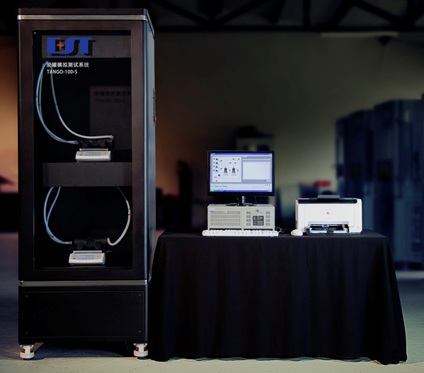Carbon canister testing system

This charcoal canister testing system can simulate the working process of charcoal canisters on motor vehicles according to the requirements of relevant regulations, and perform adsorption, desorption, aging, and pretreatment on charcoal canisters.
Product features:
After ten years of practical manufacturing and usage experience, it integrates the advantages of several similar foreign products.
EST proprietary software and control system
It can be programmed to operate automatically and manually, ensuring reliable operation.
Test standard:
This carbon canister loading system meets the following standards:
Chinese National Emission Standard for Light Vehicles GB 18352.5-2013, GB 18352.6-2016
The Chinese National Motorcycle Evaporative Emission Standard GB 14622-2007, GB 14622-2011, GB 14622-2016
Chinese National Environmental Protection Industry Standard HJ/T 390-2007
US Emission Standard EPA Regulation 86.132-96
American GM Enterprise Standard ORVR
European Emission Standard V Stage, VI stage
Basic configuration of dual traffic system:
High precision quality flow controller suitable for dual flow
Electronic balance
Maintenance free vacuum generator
High sensitivity n-butane alarm system
Programmable Logic Controller (PLC)
Desktop computer
Signal acquisition input/output module
Specialized software, menu based guided operation
printer
Sound and light alarm
Observation window
basic function
It has an independent carbon canister measurement channel and the following functions:
Initial working capacity testing of charcoal canister
Testing of the End of Life Capacity of Carbon Cans
ORVR carbon canister working ability testing
Determine the critical point of the working carbon canister by measuring the adsorption capacity of the auxiliary carbon canister to reach 2 grams or 0.5 grams;
Can simulate the setting of loading rate based on operating conditions;
Capable of simulating the desorption rate under operating conditions;
Can set the critical point of the working carbon canister arbitrarily;
Can perform more than 300 adsorption and desorption cycles and can be set arbitrarily;
Measurement and recording of temperature, humidity, atmospheric pressure, adsorption flow rate, adsorption time, desorption flow rate, desorption time, and the mass of two electronic scales;
Storage and printing of experimental results.
Carbon canister ventilation resistance detection
Desktop computer and EST software CONCORD
technical data
Loading parameters:
Small traffic channel
Butane loading speed -1 0~2.5 g/min
Butane loading accuracy ± 1% F.S
Nitrogen loading rate -1 0~1.25 g/min
Nitrogen loading accuracy ± 1% F.S
High flow channel
Butane loading speed -20~60 g/min
Butane loading accuracy ± 1% F.S
Nitrogen loading rate -20~30 g/min
Nitrogen loading accuracy ± 1% F.S
Air desorption parameters:
Air desorption flow rate 0~80 SLM
Desorption accuracy ± 2% F.S
Gas distribution unit:
Low flow gas mass flow controller (butane 1/nitrogen 1):
Full scale flow range: 0~1200SCCM
Accuracy: ± 1% F.S
Linearity: ± 0.5-1% F.S
Repeatability: ± 0.2% F.S
Response time: ≤ 2sec
Voltage resistance: 3 Mpa
High flow gas mass flow controller (butane 2/nitrogen 2):
Full scale flow range: 0~25SLM
Accuracy: ± 1% F.S
Linearity: ± 0.5-1% F.S
Repeatability: ± 0.2% F.S
Response time: ≤ 2sec
Voltage resistance: 3 Mpa
Gas mass flow controller (air)
Full scale flow range: 0~80SLM
Accuracy: ± 1% F.S
Linearity: ± 0.5-1% F.S
Repeatability: ± 0.2% F.S
Response time: ≤ 2 sec
Voltage resistance: 3 MPa
Solenoid valve
Material: Brass
Standard voltage: AC:230V,-10%/+5%,50/60 Hz
Protection level: IP65,DIN40050
Electrical connection: DIN43650 junction box
Vacuum generator nozzle diameter: 2.5mm
Maximum vacuum degree: 85%;
Maximum suction capacity: 184 l/min
Air consumption during inhalation: 275l/min
Work pressure: 6 Bar
Differential pressure sensor (ventilation resistance) Differential pressure: 0 – 20KPa
Accuracy: 0.1% FS
Output: 4 – 20 mA
Power Supply: 24 V DC
In order to measure the ventilation resistance characteristics of the carbon canister, corresponding hardware such as solenoid valves and pipelines need to be added. Supporting software is also necessary.
Detection principle of butane alarm: catalytic combustion type,
Measurement range: 0-100% LEL;
Accuracy: ± 3% FS
Response time: ≤ 30S
Recovery time: ≤ 30S
Explosion proof mark (GB3836.8-2003): Exd II CT6
Measurement and control unit:
Electronic balance (main carbon canister) weighing range: ≤ 6200g
Repeatability: ≤ ±0.01g
Linear: ≤ ±0.02g
Reading accuracy: 0.01g
Electronic balance (auxiliary carbon canister) weighing range: ≤ 3200g
Repeatability: ≤ ±0.01g
Linear: ≤ ±0.02g
Reading accuracy: 0.01g
PLC Siemens S7 series
EST software
16 bit input/output module
Two stage sound and light alarm, promptly cut off the main power supply
Explosion proof power plug
Power supply 220V ± 10%, 50Hz, three wire
Rated power 800W
Connect explosion-proof safety socket
Protection level (IEC60529) IP 22
Gas interface metal quick connect port
The equipment weighs approximately 260kg
System centralized control device
Mainstream models and configurations in the desktop PC computer market
PC control software EST CONCORD
Main functions of the software:
The charcoal canister testing system operates independently,
Real time monitoring of the status of carbon canister testing process
Sampling and storage of data during the carbon canister testing process
Calculate the working capacity of the carbon canister
Query and export historical data of carbon canister testing
Calculation and comparison of test data
Generate carbon canister test report
printer: A4
System operating conditions
Environmental temperature 15 to 45 ℃
Humidity: 10 to 85% r.h.
Compressed air at 6 bar, oil and water removed
N-Butane purity ≥ 98%, pressure 1 bar
Nitrogen purity ≥ 98%, pressure 1 bar
